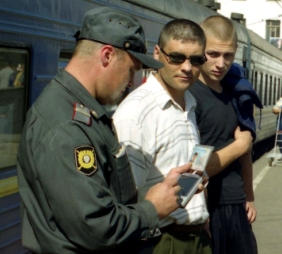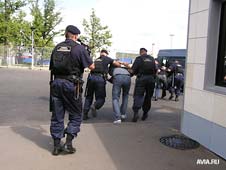It comes as no surprise that political and civic activists in Russia experience harassment from police. Members of the opposition have long complained that they have been followed, detained as they travel by train, or even threatened by the militsiya. Yet the scope and systematic nature of such activities is just beginning to come to light.
As it turns out, the Russian police are creating databases used to the track the movements of law-abiding citizens. The project is overseen by a new department for countering extremism within the Russian police, but often targeted at individuals for no reason other than their political views or activism.
Journalist Irina Borogan documents these “black lists” in the third in a series of articles documenting the government campaign to battle extremism and strengthen control over the public. The series is a joint project between the Yezhednevny Zhurnal online newspaper and the Agentura.ru web portal, which specializes in investigating Russia’s intelligence agencies.
Previous articles have focused on the nature of the new anti-extremism department of the Russian police and have questioned why emphasis has shifted from battling organized crime to extremism. The next article will examine electronic surveillance systems and their use to control the behavior of groups of people.
–
The Kremlin’s Anti-Crisis Package: How and Why “Black Lists” Are Made
Irina Borogan
June 2, 2009
Yezhednevny Zhurnal
Since the spring of this year, thousands of policemen throughout the entire country have been forced to engage in the search for extremists. It is already plain to see that there aren’t enough extremists to go around: according tothe Ministry of Internal Affair’s [MVD] Central Informational-Analytical Center (GIATs), in 2008, there were 379 people in Russia identified for committing “extremist” crimes. For a whole Department of the MVD, which has units (the E centers) in nearly every region, this is clearly insufficient. Which means that the number of extremists must be supplemented. But doing this legally, through the courts, will be difficult: in the last year, the courts refused to recognize extremist motives in nearly half of all cases, and the cases fell apart.
In such a situation, the policemen will need to work on “preventing” crimes, as Minister [Rashid] Nurgaliev is constantly calling on them to do. And this calls for different methods for the tacit surveillance of suspects: tapping telephones, opening and inspecting mail, monitoring travel within the country and outside its borders, and so forth. But first, the circle of people suspected of extremism must be determined, designating the people whose potential crime consists of spreading radical views or simply points of view that don’t coincide with the views of authorities.
The fact that these “black” lists of citizens exist has not only been expressed by human rights activists, but by policemen themselves as they report on the work they have done. But now one can confidently assert that there is secret surveillance and data gathering being conducted on the citizen who ended up on such a list. And this has recently been deemed lawful.
Details that emerged in court
In April 2009, when [authorities] announced that the creation of anti-extremist units in the country was completed, a court ruled lawful the MVD’s tracking of the movements of Sergey Shimovolos, which was done on order from the local UBOP (now – the Center for Countering Extremism). During the trial, it came to light that 3,865 Russians were under this type of surveillance in 2007.
All of these people, including Sergey Shimovolos, the chair of the Nizhny-Novgorod Human Rights Society, were put on a police list, and a so-called “watchdog surveillance” (storozhevoy kontrol). Now, their names come up in the very same electronic card files that have data on criminals on the wanted list.
The assumption that the militsiya and FSB were creating “black lists” of political and social activists emerged several years ago. People began to notice that not a single trip to a public function, whether a “March of Dissent” or a human rights conference, happened without problems from the police. Moreover, people in uniform sometimes sprang up at nearly every stop along the social activist’s whole itinerary.
In May 2007, for instance, when Sergey Shimovolos was making his way from Nizhny Novgorod to Samara in order to conduct an independent investigation of restrictions put on protests during the G-8 summit, he was checked three times: in the Nizhny Novgorod and Samara Oblasts, as well as mid-trip – in the Republic of Mordovia. Each time, an officer of the transit police asked him to explain where he was headed and what he planned to do there. Clearly, the checks were planned and initiated, and notably in three regions at once. But how?
“In Samara I was lucky: the policemen honestly wrote in the report, that they detained me on the grounds a telegram (teletypogram) they received, and had to question me in line with crime prevention measures for conducting protest actions,” Sergey Shimovolos told the Yezhednevny Zhurnal. Afterward, through court, I received materials that bore witness to the fact that I was put under “watchdog surveillance” by a decision of the Nizhny Novgorod Oblast UBOP [Organized Crime Unit], which allowed them to strategically monitor my movements through the ticket sales database.”
Shimovolos decided to protest his surveillance in court. He asked the court to recognize that these measures violate a person’s rights, and to compel the MVD to destroy all records of him and all citizens who had not been deemed to be extremists by a court, but had still been entered into this database. On April 22, 2009, the Nizhny Novgorod District Court refused the human rights activist on all counts.

What is “watchdog surveillance”
Shimovolos lost, but thanks to his lawsuit, we learned how the system of surveillance over law-abiding citizens is carried out.
Information about Shimovolos made its way into the “Rozysk-magistral” (“Wanted Line”) electronic database of the Russian Federation MVD on March 19, 2007. The decision to include his information into the database was made by officers in the UBOP GUVD for the Nizhny Novgorod Oblast, based upon strategic reasons that comprise a state secret, in the opinion of the police. Shimovolos himself assumes this happened because he was among the organizers of a “March of Dissent” in Nizhny Novgorod.
Having put Shimovolos’s details into the “Wanted Line” database, the policemen put him on “watchdog surveillance:” one type of record that exists to track someone’s movements.
At first, the MVD’s “Wanted Line” hardware and software suite (PTK) was created to automatically assist in the search for criminals on the federal and local wanted lists. The PTK is “linked” to the “Express” and “Magistral” databases, which constantly receive information about train and airline tickets purchased by Russians. When a criminal buys a ticket, the information makes its way into the PTK server. Next, this information is communicated to the local transport police (OVD), located along the itinerary of the passenger train and in airports. The objective is clear – the arrest of the criminal.
At the same time, data about law-abiding citizens, like Shimovolos, were introduced into the PTK. They were then put on “watchdog surveillance.” The whole procedure is the same, except that instead of an arrest, policemen receive instructions of what kind of work they must conduct with the citizens who are not suspected of a criminal offense.*
The Yezhednevny Zhurnal received further proof of how this system works from Roman Dobrokhotov, a participant in the “For Human Rights” movement. On May 6, 2009, Dobrokhotov came by train from Volgograd to the capital’s Paveletsky Rail Terminal, where he was detained by a policeman waiting for him by the rail car’s exit. The UVD officer was ordered to have a preventative talk with him. As it turned out, Dobrokhotov was arrested on the basis of an [official] message, which spelled out in black and white how the Center for Investigative Information of the Moscow UVD for Transport reported that Dobrokhotov was put on “watchdog surveillance” by the Department for Countering Extremism of the RF MVD.
As result, the efforts of at least three police units were expended to track Dobrokhotov’s route. The activist has never been indicted on criminal charges, but has taken part in different non-systemic political movements.






















